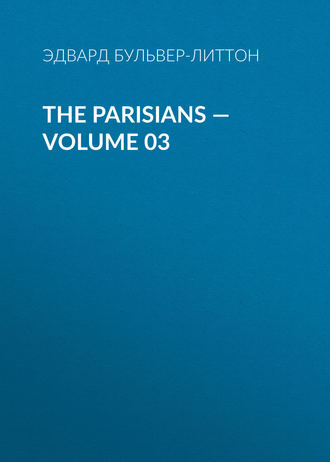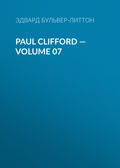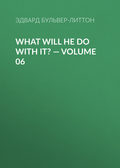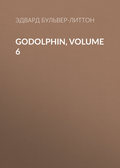
Эдвард Бульвер-Литтон
The Parisians — Volume 03
BOOK III
CHAPTER I
The next day the guests at the Morleys' had assembled when Vane entered. His apology for unpunctuality was cut short by the lively hostess. "Your pardon is granted without the humiliation of asking for it; we know that the characteristic of the English is always to be a little behindhand."
She then proceeded to introduce him to the American Minister, to a distinguished American poet, with a countenance striking for mingled sweetness and power, and one or two other of her countrymen sojourning at Paris; and this ceremony over, dinner was announced, and she bade Graham offer his arm to Mademoiselle Cicogna.
"Have you ever visited the United States, Mademoiselle?" asked Vane, as they seated themselves at the table.
"No."
"It is a voyage you are sure to make soon."
"Why so?"
"Because report says you will create a great sensation at the very commencement of your career; and the New World is ever eager to welcome each celebrity that is achieved in the Old,—more especially that which belongs to your enchanting art."
"True, sir," said an American senator, solemnly striking into the conversation; "we are an appreciative people; and if that lady be as fine a singer as I am told, she might command any amount of dollars."
Isaura coloured, and turning to Graham, asked him in a low voice if he were fond of music.
"I ought of course to say 'yes,' answered Graham, in the same tone; "but I doubt if that 'yes' would be an honest one. In some moods, music—if a kind of music I like—affects me very deeply; in other moods, not at all. And I cannot bear much at a time. A concert wearies me shamefully; even an opera always seems to me a great deal too long. But I ought to add that I am no judge of music; that music was never admitted into my education; and, between ourselves, I doubt if there be one Englishman in five hundred who would care for opera or concert if it were not the fashion to say he did. Does my frankness revolt you?"
"On the contrary, I sometimes doubt, especially of late, if I am fond of music myself."
"Signorina,—pardon me,—it is impossible that you should not be. Genius can never be untrue to itself, and must love that in which it excels, that by which it communicates joy, and," he added, with a half-suppressed sigh, "attains to glory."
"Genius is a divine word, and not to be applied to a singer," said Isaura, with a humility in which there was an earnest sadness.
Graham was touched and startled; but before he could answer, the American Minister appealed to him across the table, asking if he had quoted accurately a passage in a speech by Graham's distinguished father, in regard to the share which England ought to take in the political affairs of Europe.
The conversation now became general, very political and very serious. Graham was drawn into it, and grew animated and eloquent.
Isaura listened to him with admiration. She was struck by what seemed to her a nobleness of sentiment which elevated his theme above the level of commonplace polemics. She was pleased to notice, in the attentive silence of his intelligent listeners, that they shared the effect produced on herself. In fact, Graham Vane was a born orator, and his studies had been those of a political thinker. In common talk he was but the accomplished man of the world, easy and frank and genial, with a touch of good-natured sarcasm; but when the subject started drew him upward to those heights in which politics become the science of humanity, he seemed a changed being. His cheek glowed, his eye brightened, his voice mellowed into richer tones, his language be came unconsciously adorned. In such moments there might scarcely be an audience, even differing from him in opinion, which would not have acknowledged his spell.
When the party adjourned to the salon, Isaura said softly to Graham, "I understand why you did not cultivate music; and I think, too, that I can now understand what effects the human voice can produce on human minds without recurring to the art of song."
"Ah," said Graham, with a pleased smile, "do not make me ashamed of my former rudeness by the revenge of compliment; and, above all, do not disparage your own art by supposing that any prose effect of voice in its utterance of mind can interpret that which music alone can express, even to listeners so uncultured as myself. Am I not told truly by musical composers, when I ask them to explain in words what they say in their music, that such explanation is impossible, that music has a language of its own untranslatable by words?"
"Yes," said Isaura, with thoughtful brow but brightening eyes, "you are told truly. It was only the other day that I was pondering over that truth."
"But what recesses of mind, of heart, of soul, this untranslatable language penetrates and brightens up! How incomplete the grand nature of man—though man the grandest—would be, if you struck out of his reason the comprehension of poetry, music, and religion! In each are reached and are sounded deeps in his reason otherwise concealed from himself. History, knowledge, science, stop at the point in which mystery begins. There they meet with the world of shadow. Not an inch of that world can they penetrate without the aid of poetry and religion, two necessities of intellectual man much more nearly allied than the votaries of the practical and the positive suppose. To the aid and elevation of both those necessities comes in music, and there has never existed a religion in the world which has not demanded music as its ally. If, as I said frankly, it is only in certain moods of my mind that I enjoy music, it is only because in certain moods of my mind I am capable of quitting the guidance of prosaic reason for the world of shadow; that I am so susceptible as at every hour, were my nature perfect, I should be to the mysterious influences of poetry and religion. Do you understand what I wish to express?"
"Yes, I do, and clearly."
"Then, Signorina, you are forbidden to undervalue the gift of song. You must feel its power over the heart, when you enter the opera-house; over the soul, when you kneel in a cathedral."
"Oh," cried Isaura, with enthusiasm, a rich glow mantling over her lovely face, "how I thank you! Is it you who say you do not love music? How much better you understand it than I did till this moment!"
Here Mrs. Morley, joined by the American poet, came to the corner in which the Englishman and the singer had niched themselves. The poet began to talk, the other guests gathered round, and every one listened reverentially till the party broke up. Colonel Morley handed Isaura to her carriage; the she-mountebank again fell to the lot of Graham.
"Signor," said she, as he respectfully placed her shawl round her scarlet-and-gilt jacket, "are we so far from Paris that you cannot spare the time to call? My child does not sing in public, but at home you can hear her. It is not every woman's voice that is sweetest at home."
Graham bowed, and said he would call on the morrow. Isaura mused in silent delight over the words which had so extolled the art of the singer. Alas, poor child! she could not guess that in those words, reconciling her to the profession of the stage, the speaker was pleading against his own heart.
There was in Graham's nature, as I think it commonly is in that of most true orators, a wonderful degree of intellectual conscience which impelled him to acknowledge the benignant influences of song, and to set before the young singer the noblest incentives to the profession to which he deemed her assuredly destined; but in so doing he must have felt that he was widening the gulf between her life and his own. Perhaps he wished to widen it in proportion as he dreaded to listen to any voice in his heart which asked if the gulf might not be overleapt.
CHAPTER II
ON the morrow Graham called at the villa at A———. The two ladies received him in Isaura's chosen sitting-room.
Somehow or other, conversation at first languished. Graham was reserved and distant, Isaura shy and embarrassed. The Venosta had the frais of making talk to herself. Probably at another time Graham would have been amused and interested in the observation of a character new to him, and thoroughly southern,—lovable not more from its naive simplicity of kindliness than from various little foibles and vanities, all of which were harmless, and some of them endearing as those of a child whom it is easy to make happy, and whom it seems so cruel to pain; and with all the Venosta's deviations from the polished and tranquil good taste of the beau monde, she had that indescribable grace which rarely deserts a Florentine, so that you might call her odd but not vulgar; while, though uneducated, except in the way of her old profession, and never having troubled herself to read anything but a libretto and the pious books commended to her by her confessor, the artless babble of her talk every now and then flashed out with a quaint humour, lighting up terse fragments of the old Italian wisdom which had mysteriously embedded themselves in the groundwork of her mind.
But Graham was not at this time disposed to judge the poor Venosta kindly or fairly. Isaura had taken high rank in his thoughts. He felt an impatient resentment mingled with anxiety and compassionate tenderness at a companionship which seemed to him derogatory to the position he would have assigned to a creature so gifted, and unsafe as a guide amidst the perils and trials to which the youth, the beauty, and the destined profession of Isaura were exposed. Like most Englishmen—especially Englishmen wise in the knowledge of life—he held in fastidious regard the proprieties and conventions by which the dignity of woman is fenced round; and of those proprieties and conventions the Venosta naturally appeared to him a very unsatisfactory guardian and representative.
Happily unconscious of these hostile prepossessions, the elder Signora chatted on very gayly to the visitor. She was in excellent spirits; people had been very civil to her both at Colonel Morley's and M. Louvier's. The American Minister had praised the scarlet jacket. She was convinced she had made a sensation two nights running. When the amour propre is pleased, the tongue is freed.
The Venosta ran on in praise of Paris and the Parisians; of Louvier and his soiree and the pistachio ice; of the Americans, and a certain creme de maraschino which she hoped the Signor Inglese had not failed to taste,—the creme de maraschino led her thoughts back to Italy. Then she grew mournful. How she missed the native beau ciel! Paris was pleasant, but how absurd to call it "le Paradis des Femmes,"—as if les Femmes could find Paradise in a brouillard!
"But," she exclaimed, with vivacity of voice and gesticulation, "the Signor does not come to hear the parrot talk; he is engaged to come that he may hear the nightingale sing. A drop of honey attracts the fly more than a bottle of vinegar."
Graham could not help smiling at this adage. "I submit," said he, "to your comparison as regards myself; but certainly anything less like a bottle of vinegar than your amiable conversation I cannot well conceive. However, the metaphor apart, I scarcely know how I dare ask Mademoiselle to sing after the confession I made to her last night."
"What confession?" asked the Venosta.
"That I know nothing of music and doubt if I can honestly say that I am fond of it."
"Not fond of music! Impossible! You slander yourself. He who loves not music would have a dull time of it in heaven. But you are English, and perhaps have only heard the music of your own country. Bad, very bad—a heretic's music! Now listen."
Seating herself at the piano, she began an air from the "Lucia," crying out to Isaura to come and sing to her accompaniment.
"Do you really wish it?" asked Isaura of Graham, fixing on him questioning, timid eyes.
"I cannot say how much I wish to hear you."
Isaura moved to the instrument, and Graham stood behind her. Perhaps he felt that he should judge more impartially of her voice if not subjected to the charm of her face.
But the first note of the voice held him spell-bound. In itself the organ was of the rarest order, mellow and rich, but so soft that its power was lost in its sweetness, and so exquisitely fresh in every note.
But the singer's charm was less in voice than in feeling; she conveyed to the listener so much more than was said by the words, or even implied by the music. Her song in this caught the art of the painter who impresses the mind with the consciousness of a something which the eye cannot detect on the canvas.
She seemed to breathe out from the depths of her heart the intense pathos of the original romance, so far exceeding that of the opera,-the human tenderness, the mystic terror of a tragic love-tale more solemn in its sweetness than that of Verona.
When her voice died away no applause came,—not even a murmur. Isaura bashfully turned round to steal a glance at her silent listener, and beheld moistened eyes and quivering lips. At that moment she was reconciled to her art. Graham rose abruptly and walked to the window.
"Do you doubt now if you are fond of music?" cried the Venosta.
"This is more than music," answered Graham, still with averted face. Then, after a short pause, he approached Isaura, and said, with a melancholy half-smile,—
"I do not think, Mademoiselle, that I could dare to hear you often; it would take me too far from the hard real world: and he who would not be left behindhand on the road that he must journey cannot indulge frequent excursions into fairyland."
"Yet," said Isaura, in a tone yet sadder, "I was told in my childhood, by one whose genius gives authority to her words, that beside the real world lies the ideal. The real world then seemed rough to me. 'Escape,' said my counsellor, 'is granted from that stony thoroughfare into the fields beyond its formal hedgerows. The ideal world has its sorrows, but it never admits despair.' That counsel then, methought, decided my choice of life. I know not now if it has done so."
"Fate," answered Graham, slowly and thoughtfully, "Fate, which is not the ruler but the servant of Providence, decides our choice of life, and rarely from outward circumstances. Usually the motive power is within. We apply the word 'genius' to the minds of the gifted few; but in all of us there is a genius that is inborn, a pervading something which distinguishes our very identity, and dictates to the conscience that which we are best fitted to do and to be. In so dictating it compels our choice of life; or if we resist the dictate, we find at the close that we have gone astray. My choice of life thus compelled is on the stony thoroughfares, yours in the green fields."
As he thus said, his face became clouded and mournful. The Venosta, quickly tired of a conversation in which she had no part, and having various little household matters to attend to, had during this dialogue slipped unobserved from the room; yet neither Isaura nor Graham felt the sudden consciousness that they were alone which belongs to lovers. "Why," asked Isaura, with that magic smile reflected in countless dimples which, even when her words were those of a man's reasoning, made them seem gentle with a woman's sentiment,—"why must your road through the world be so exclusively the stony one? It is not from necessity, it can. not be from taste; and whatever definition you give to genius, surely it is not your own inborn genius that dictates to you a constant exclusive adherence to the commonplace of life."
"Ah, Mademoiselle, do not misrepresent me. I did not say that I could not sometimes quit the real world for fairyland,—I said that I could not do so often. My vocation is not that of a poet or artist."
"It is that of an orator, I know," said Isaura, kindling; "so they tell me, and I believe them. But is not the orator somewhat akin to the poet? Is not oratory an art?"
"Let us dismiss the word orator; as applied to English public life, it is a very deceptive expression. The Englishman who wishes to influence his countrymen by force of words spoken must mix with them in their beaten thoroughfares; must make himself master of their practical views and interests; must be conversant with their prosaic occupations and business; must understand how to adjust their loftiest aspirations to their material welfare; must avoid as the fault most dangerous to himself and to others that kind of eloquence which is called oratory in France, and which has helped to make the French the worst politicians in Europe. Alas! Mademoiselle, I fear that an English statesman would appear to you a very dull orator."
"I see that I spoke foolishly,—yes, you show me that the world of the statesman lies apart from that of the artist. Yet—"
"Yet what?"
"May not the ambition of both be the same?"







